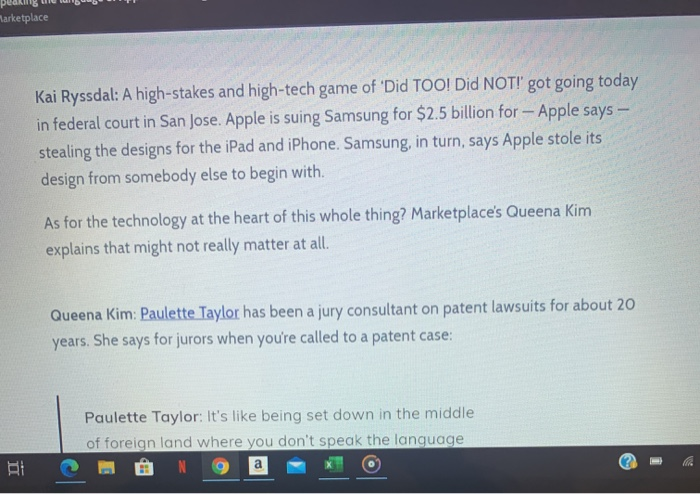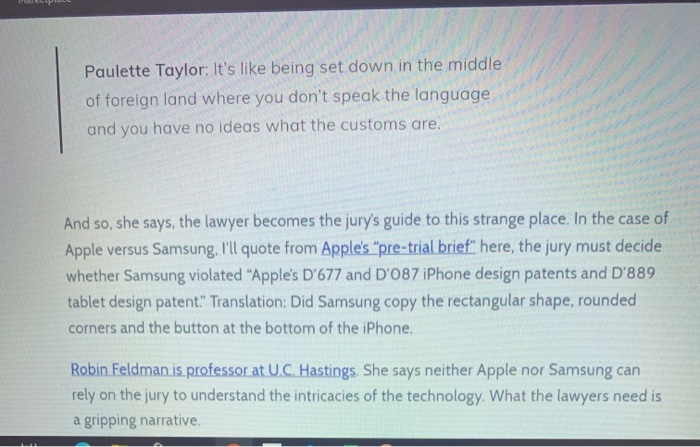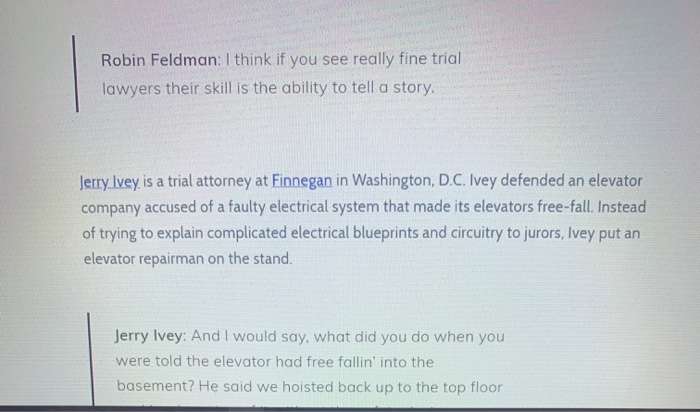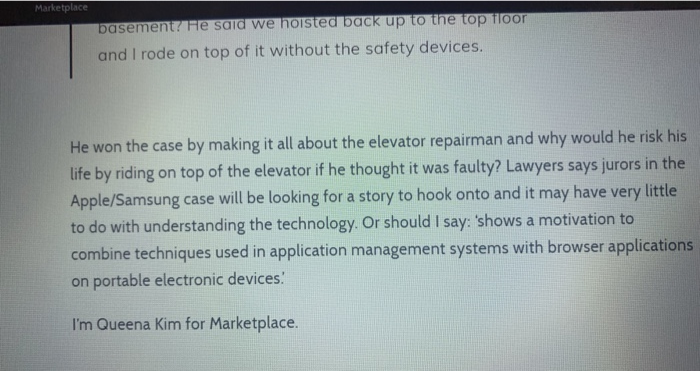Marketplace Kai Ryssdal: A high-stakes and high-tech game of 'Did TOO! Did NOT! got going today in federal court in San Jose. Apple is suing Samsung for $2.5 billion for -- Apple says stealing the designs for the iPad and iPhone. Samsung, in turn, says Apple stole its design from somebody else to begin with. As for the technology at the heart of this whole thing? Marketplace's Queena Kim explains that might not really matter at all. Queena Kim: Paulette Taylor has been a jury consultant on patent lawsuits for about 20 years. She says for jurors when you're called to a patent case: Paulette Taylor: It's like being set down in the middle of foreign land where you don't speak the language Paulette Taylor: It's like being set down in the middle of foreign land where you don't speak the language and you have no ideas what the customs are. And so, she says, the lawyer becomes the jury's guide to this strange place. In the case of Apple versus Samsung, I'll quote from Apple's "pre-trial brief" here, the jury must decide whether Samsung violated "Apple's D'677 and D'087 iPhone design patents and D'889 tablet design patent." Translation: Did Samsung copy the rectangular shape, rounded corners and the button at the bottom of the iPhone. Robin Feldman is professor at U.C. Hastings. She says neither Apple nor Samsung can rely on the jury to understand the intricacies of the technology. What the lawyers need is a gripping narrative Robin Feldman: I think if you see really fine trial lawyers their skill is the ability to tell a story. Jerry Ivey, is a trial attorney at Finnegan in Washington, D.C. Ivey defended an elevator company accused of a faulty electrical system that made its elevators free-fall. Instead of trying to explain complicated electrical blueprints and circuitry to jurors, Ivey put an elevator repairman on the stand. Jerry Ivey: And I would say, what did you do when you were told the elevator had free fallin' into the basement? He said we hoisted back up to the top floor Marketplace basement? He said we hoisted back up to the top floor and I rode on top of it without the safety devices. He won the case by making it all about the elevator repairman and why would he risk his life by riding on top of the elevator if he thought it was faulty? Lawyers says jurors in the Apple/Samsung case will be looking for a story to hook onto and it may have very little to do with understanding the technology. Or should I say: 'shows a motivation to combine techniques used in application management systems with browser applications on portable electronic devices! I'm Queena Kim for Marketplace. Marketplace Kai Ryssdal: A high-stakes and high-tech game of 'Did TOO! Did NOT! got going today in federal court in San Jose. Apple is suing Samsung for $2.5 billion for -- Apple says stealing the designs for the iPad and iPhone. Samsung, in turn, says Apple stole its design from somebody else to begin with. As for the technology at the heart of this whole thing? Marketplace's Queena Kim explains that might not really matter at all. Queena Kim: Paulette Taylor has been a jury consultant on patent lawsuits for about 20 years. She says for jurors when you're called to a patent case: Paulette Taylor: It's like being set down in the middle of foreign land where you don't speak the language Paulette Taylor: It's like being set down in the middle of foreign land where you don't speak the language and you have no ideas what the customs are. And so, she says, the lawyer becomes the jury's guide to this strange place. In the case of Apple versus Samsung, I'll quote from Apple's "pre-trial brief" here, the jury must decide whether Samsung violated "Apple's D'677 and D'087 iPhone design patents and D'889 tablet design patent." Translation: Did Samsung copy the rectangular shape, rounded corners and the button at the bottom of the iPhone. Robin Feldman is professor at U.C. Hastings. She says neither Apple nor Samsung can rely on the jury to understand the intricacies of the technology. What the lawyers need is a gripping narrative Robin Feldman: I think if you see really fine trial lawyers their skill is the ability to tell a story. Jerry Ivey, is a trial attorney at Finnegan in Washington, D.C. Ivey defended an elevator company accused of a faulty electrical system that made its elevators free-fall. Instead of trying to explain complicated electrical blueprints and circuitry to jurors, Ivey put an elevator repairman on the stand. Jerry Ivey: And I would say, what did you do when you were told the elevator had free fallin' into the basement? He said we hoisted back up to the top floor Marketplace basement? He said we hoisted back up to the top floor and I rode on top of it without the safety devices. He won the case by making it all about the elevator repairman and why would he risk his life by riding on top of the elevator if he thought it was faulty? Lawyers says jurors in the Apple/Samsung case will be looking for a story to hook onto and it may have very little to do with understanding the technology. Or should I say: 'shows a motivation to combine techniques used in application management systems with browser applications on portable electronic devices! I'm Queena Kim for Marketplace










